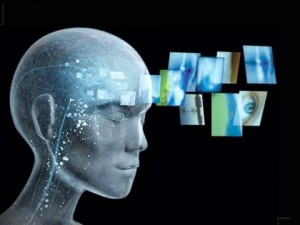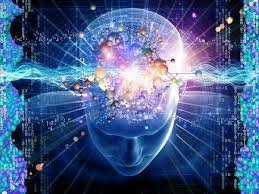An old philosophical canard refers to ‘the ghost in the machine’—consciousness in the brain. Philosophers don’t believe in ghosts, but most sure do believe in machines.
 For example, the renowned and recently disgraced academic philosopher, Colin McGinn, published an essay in the New Statesman last year entitled, “All Machine and No Ghost?” The piece begins with at once a solid and ephemeral set of questions (itself no mean trick), but then proceeds to immediately go off the rails with an unexamined assumption that nearly all philosophers take as a given.
For example, the renowned and recently disgraced academic philosopher, Colin McGinn, published an essay in the New Statesman last year entitled, “All Machine and No Ghost?” The piece begins with at once a solid and ephemeral set of questions (itself no mean trick), but then proceeds to immediately go off the rails with an unexamined assumption that nearly all philosophers take as a given.
The brain-taxing set of questions is: “What is consciousness, why does it exist, how is it related to the body and brain, and how did it come into existence?” If that sounds a bit like a Zen koan, it’s not meant to be. This question, or some variation of it, is at the core of philosophy of mind.
While the questions are quintessentially valid, and need to be addressed without any preconditions, the article goes on the frame the debate in a way that presupposes the outcome.
“Try to imagine a world with no consciousness in it, just clashing quanta in the void and clumps of dead, insensate matter (the way our universe used to be); now add consciousness to it.”
“The way our universe used to be?” That’s a classic assumption and unexamined premise. Be careful what you parenthesize, it may unwittingly emphasize.
Philosophy and science have yet to explain how “clumps of dead, insensate matter” become lumps of living, sensate flesh. The various conceptualizations of how consciousness can be and came to be—dualism, idealism, reductionism and panpsychism—fail to resolve the mystery. McGinn takes final refuge in something called ‘mysterianism,’ declaring consciousness to be an unsolvable mystery.
“The more we know of the brain,” McGinn declares, “the less it looks like a device for creating consciousness:  it’s just a big collection of biological cells and a blur of electrical activity – all machine and no ghost.”
it’s just a big collection of biological cells and a blur of electrical activity – all machine and no ghost.”
Descartes’ dualism rightly strikes our postmodern ears as begging the question: If mind and matter are separate, how did mind come into being? Are we are compelled to posit the infinite regression of a Supreme Being that breathed consciousness into us?
Idealism doesn’t cut it either, since the idea that everything is mind (a favorite theme and meme of New Age philosophy), makes a mockery of material reality. And it simply ignores or whitewashes the real-world contradiction between man and nature, and the threat that one sentient species poses to the other animals with whom it shares the planet.
Panpsychism is more interesting and enticing, but as McGinn says, it “looks a lot like preformationism in biology: we try to explain the emergence of organic life by supposing that it already exists in microscopic form in the pre-life world—as if the just-fertilized egg has a little, fully formed baby curled up in it waiting to expand during gestation.”
Even so, panpsychism points in the right direction in my view. There’s consciousness that’s epiphenomenon, and consciousness that’s phenomenon. The first is the result of physical brain processes; the second is not solely produced from brain processes. The former is what we usually know; the latter is called ‘mystical experience,’ which is denied by the idea of “clashing quanta in the void and clumps of dead, insensate matter.”
Consciousness as we usually know it–the associative, chattering mind–is a by-product of so-called higher thought. It’s inherently limited, and when primary, as it is with man, it’s inevitably destructive.
 Even so, content-consciousness, as a by-product of the evolution of symbolic thought, is a partial manifestation of cosmic consciousness, which permeates the universe as a whole. The brain, having crossed the evolutionary threshold enabling symbolic thought, gave humans the capacity for cosmic consciousness; but at the same time, the symbol producing brain is also the greatest impediment to realizing full consciousness.
Even so, content-consciousness, as a by-product of the evolution of symbolic thought, is a partial manifestation of cosmic consciousness, which permeates the universe as a whole. The brain, having crossed the evolutionary threshold enabling symbolic thought, gave humans the capacity for cosmic consciousness; but at the same time, the symbol producing brain is also the greatest impediment to realizing full consciousness.
Whether other animals on this planet are sentient (conscious that they are conscious), I don’t know, but I doubt it. As intelligent as Orcas, bonobos and crows are, as much as they communicate with each other at high levels with complex ‘languages,’ they don’t live in symbolic worlds of their own making, separating themselves from nature and each other.
In short, the paradox is that universe evolves brains capable of awareness of Mind, but that in so doing, the separating mind gets in the way of the capacity of the brain for awareness of the immeasurable wholeness of the cosmos. That’s our riddle to resolve, philosophically and individually.
There are resolvable mysteries that continually require uncovering and explaining; and there is an irresolvable mystery that continuously requires discovering and venerating. McGinn closes out the former, while diminishing the latter.
It’s simply not good enough for philosophy to retreat into mysterianism and say: “Human intelligence is a local, contingent, temporal, practical and expendable feature of life on earth – an incremental adaptation based on earlier forms of intelligence.” That’s both false modesty, and false mystery.
It isn’t a matter of aspiring to omniscience, but finding the right balance between the pursuit of knowledge and explanation, and the prime directive of humility and stillness in the face of the infinite mystery and miracle of consciousness.
Martin LeFevre


2 comments
I don’t actually think consciousness is intrinsically mysterious. It does seem mysterious to us, but I think this is an artificial mystery created by a deeply-held notion that physical matter is our primary interface with reality, and a resulting difficulty in envisioning how we might think of consciousness experiences if we had never developed a concept of the physical world. If physical matter is our primary interface with reality, then an event that seems to occur independently of the physical world is indeed mysterious. But imagine that our only experiences were audible musical notes, or tastes or smells, with no sensation of having a body. In that case there would be no mystery about how these sensations might be produced independently of a physical world (though there would be a great mystery about what we were and why we were having these experiences). A committed materialist or dualist will say that the mystery would still be there, but that it would just not occur to us in those circumstances. When performing this exercise, he will just imagine a person with a physical body but with no visual or tactile sensation, in an odd environment. But if you insist on bringing a physical presence into the picture you are begging the question. The question is, can we imagine having a conscious experience in the absence of a physical presence? And the answer is yes. Well in that case, physical matter is not our primary interface with reality, as our concept of as “physical reality” is revealed to be merely a product of the conscious experiences we have. See a fuller exposition here: http://www.academia.edu/3225813/A_Synthesis_of_Physical_and_Nonphysical_Objects
From Martin – You didn’t read the piece very carefully, since in part you’re saying the same thing I did in it, except that you’re lumping thought-based consciousness and awareness without thought together. The latter isn’t a matter of imagination, since imagination is a faculty of thought. Negating the observer/thought in attention, the whole movement falls silent, and the consciousness of pure awareness is. As I said in the column, there are mysteries to be solved, and an infinite mystery to venerate.